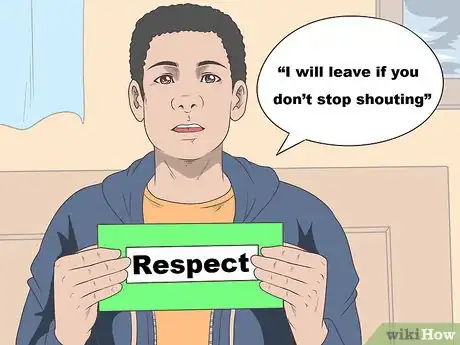This article was co-authored by Trudi Griffin, LPC, MS. Trudi Griffin is a Licensed Professional Counselor in Wisconsin specializing in Addictions and Mental Health. She provides therapy to people who struggle with addictions, mental health, and trauma in community health settings and private practice. She received her MS in Clinical Mental Health Counseling from Marquette University in 2011.
There are 9 references cited in this article, which can be found at the bottom of the page.
This article has been viewed 104,626 times.
Anger is a common emotion and can easily spiral into rage, so there's a chance you will someday encounter a friend, family member, or partner who has trouble controlling their anger. You can help them, first and foremost, by reeling in your own emotions, as becoming upset yourself will likely worsen the problem. After responding appropriately and de-escalating their anger, try motivating them to get help for their anger. Having a loved one with a fiery temper can be stressful, so be sure to look after yourself too.
Steps
Defusing Tension in the Moment
-
1Stay calm during tense situations. If your loved one gets angry, the only way you can effectively defuse the situation is by getting a hold of your own anger. Losing your own temper will only make matters worse. Breathe in and out deeply. Count silently to 100 or go splash water on your face to clear your head.[1]
-
2Speak in an even, moderate tone of voice. Lower your voice, so that it's just above a whisper. Doing this helps you maintain calm without shouting, but it also reinforces appropriate communication. Your loved one will likely follow suit and lower their voice, too.[2]Advertisement
-
3Give your full attention when listening. Many angry people get that way because they feel no one is listening to them. Turn off your loved one's angry switch by giving them 100% of your attention. Turn to face them and hear them out without interrupting.[3]
- Being a good listener could help defuse the situation completely. Be sure to pay attention to the underlying issue.
-
4Show compassion towards the other person. Your loved one may act angry because they don't believe they are being heard or understood. Be sure to validate their experience and let them know that you are taking them seriously and respect their opinions.[4]
- Demonstrate your understanding by using reflection techniques. This might sound like, “I can see why you feel angry about the teller being rude to you,” or “I think I understand the problem. You feel overlooked.”
-
5Assert your boundaries. Insist that your angry loved one treat you with respect. In a calm and cool manner, say something like, “I will leave if you don't stop shouting,” or “I won't continue this conversation if you engage in name-calling.”[5]
- Once a boundary has been communicated, be firm and follow through if the person crosses the line.
-
6Use “I” statements to discuss the problem. You want to steer clear of criticism or blame, so interact using “I” statements that convey your needs without placing blame. These statements don't attack the other person, but they do let you communicate how you feel about the issue.[6]
- For example, instead of saying “You are always shouting at me!” say “I feel anxious when you shout. Can we try to use indoor voices?”
-
7Resist the urge to give advice. Angry people often view advice as criticism, so avoid trying to fix their problem. Just actively listen. If you want to try to work out whether your loved one merely wants to vent or needs a solution, ask them— after they've finished talking.[7]
- You might ask, “Do you want help with the problem or did you just want to get everything off your chest?” before you try to offer advice. Or, you could say, “I understand your anger. How can I help?”
- If your loved one tends to view you as critical, save your solutions for another time when they've cooled off.
-
8Take a break if you need one. If you feel under attack or overwhelmed during communication with an angry person, ask for a timeout. You might say, “I don't think we're going to reach an agreement if we're shouting at each other. Let's take 10, okay?” Go someplace where you feel safe and get your own emotions under control.[8]
- Listen to soft music, watch a silly YouTube video, or call someone who tends to calm you down.
Inspiring Change
-
1Focus on the issue, not the person. Have a talk letting your loved one know how their angry behavior affects you without making it seem like they're the problem. This increases the odds of them cooperating with you and shows that you are concerned.
- Say, "I've noticed you're angry a lot lately. It prevents us from connecting like we used to. It'd make me feel better if you talked to someone about it."
- Take note of patterns regarding what angers the person to determine underlying issues. For instance, if they often get upset when people gossip about them, the underlying issue may be that they value privacy.
- Once you've determined the underlying issue, you can help the person develop strategies or create boundaries to deal with it. For example, if the person values privacy, you could caution them not to share personal information with their co-workers if it leads to office gossip.
-
2Become aware of the anger scale. Anger doesn't usually start out as anger. It may begin as annoyance, which increases to frustration, irritation, anger, and rage. Learn to identify signs of annoyance in your loved one so you can help de-escalate the situation before they become explosively angry.
- If your loved one seems to jump straight to anger or rage, skipping the earlier stages, it would be beneficial for them to receive professional help to identify their triggers and learn intervention strategies to diffuse their anger.
-
3Offer to accompany them when seeing a professional. Don't just tell your loved one they should get help without offering your support. Tell them that you are willing to help them find a therapist or an anger management class. Offer to drive them to sessions and sit in the waiting room if they'd like.
-
4Pick your battles. You won't make any headway if you have a tendency to nag your loved one about their anger problem. Plus, not every single issue requires a disagreement. Try to be selective when addressing issues. Pick your battles based on whether you feel like your boundaries have been violated.[9]
- Also, choose your battles based on timing. Aim to talk through difficult issues when your loved one is calm, sober, and in a relatively positive mood.
-
5Encourage your loved one to decrease their stress levels. People who are stressed are more likely to get angry more quickly, as stress feeds anger. If your loved one has a lower stress baseline, it will take more time for them to reach the anger stage. This gives you more time to recognize the early signs of anger and take steps to calm them down.
- Your loved one could try meditation, yoga, exercising, breathing exercises, or other strategies to control their stress.
-
6Be patient. Working with a loved one who has anger issues is like the waltz: you will take nearly as many steps backward as you do forward. Strive for patience with the person as they come to acknowledge they have a problem with anger.
Caring for Yourself
-
1Confide in a trusted friend. Offering your support to someone with anger issues can feel draining. Be sure to get support of your own by reaching out to close friends and family. Ask them to hear you out as you talk through problems or simply distract you when you don't want to discuss the issue.[10]
- Avoid gossiping about the angry person or rehashing their issues. Instead, focus on what you need to do to de-stress.
-
2Spend time with happy people. If everyone in your social circle is angry, you may become angry too. This is because people have a tendency to mimic the behavior of those around them. Make sure you have a well-rounded social circle that includes generally happy or optimistic people as well.
-
3Practice self-care. An angry environment can make you feel stressed out or anxious. Combat stress with regular self-care activities, like getting a massage, listening to soothing music, soaking in a warm bath, or doing relaxing yoga sequences.[11]
- It's fine to want to support your loved one, but try to carve out some “me time” a few days each week to do nourishing activities to fill yourself back up.
-
4Attend an anger management support group. Another way to get support is by seeking out others who understand what you are going through. Locate anger management support groups in your local area and consider attending a few meetings.[12]
- You might feel relieved to hear that others are having similar experiences. Plus, they may have useful advice to help you cope.
-
5Get help if anger turns violent. If your loved one becomes abusive, all bets are off. It is never okay to hurt someone else out of anger. At that point, you must direct your energy towards keeping yourself safe. Leave the environment if possible. Call a friend, family member, or speak to someone anonymously on a helpline.[13]
- If your spouse becomes violent, contact the National Domestic Violence Hotline at 1-800-799-7233.
- If you are a child and afraid of an adult with violent tendencies, contact the Childhelp National Child Abuse Hotline at 1-800-4-A-Child.
Conversations to Connect with Someone with Anger Issues
References
- ↑ https://www.nhs.uk/Conditions/stress-anxiety-depression/Pages/controlling-anger.aspx
- ↑ https://psychcentral.com/blog/archives/2009/03/31/help-i-live-with-someone-with-anger-issues/
- ↑ https://psychcentral.com/blog/archives/2009/03/31/help-i-live-with-someone-with-anger-issues/
- ↑ https://www.psychologytoday.com/blog/anger-in-the-age-entitlement/200904/how-deal-angry-partner
- ↑ https://www.goodtherapy.org/blog/8-strategies-for-dealing-with-angry-partner-1206165
- ↑ http://www.mentalhealthy.co.uk/other/anger-management/helping-someone-with-anger-issues.html
- ↑ http://www.mentalhealthy.co.uk/other/anger-management/helping-someone-with-anger-issues.html
- ↑ https://www.mayoclinic.org/healthy-lifestyle/adult-health/in-depth/anger-management/art-20045434
- ↑ https://www.helpguide.org/articles/relationships-communication/anger-management.htm
- ↑ https://psychcentral.com/blog/archives/2009/03/31/help-i-live-with-someone-with-anger-issues/
- ↑ https://tinybuddha.com/blog/45-simple-self-care-practices-for-a-healthy-mind-body-and-soul/
- ↑ https://www.helpguide.org/articles/relationships-communication/anger-management.htm
- ↑ https://au.reachout.com/articles/when-someone-is-always-angry
About This Article
If someone you know has trouble controlling their anger and often lashes out at people, there are ways you can help them deal with their issues. It can be difficult, but try to stay calm and use a gentle tone of voice whenever the person gets angry. Listen to their perspective and tell them that you understand. For example, say something like, “I can see why you feel angry about the teller being rude to you.” If they start to lose control or insult you, suggest a short break and come back to the issue in half an hour or so. It’s also important to set boundaries with the person. Let them know you won’t tolerate them threatening you, insulting you, or swearing at you. If they break your boundaries, walk away from the situation until they’re calm. Don’t ever accept violence from your loved one, since this will make the situation worse for both of you. If you’ve been physically assaulted, call a domestic violence hotline for help. For more tips from our co-author, including how to de-stress after a heated argument, read on.

















































































